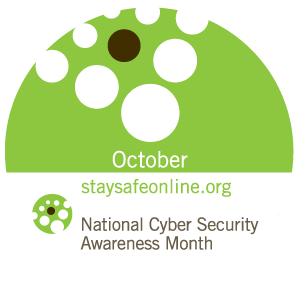 October is National Cyber Security Awareness Month. The African-American Cyber Report is dedicated to bringing the latest most relevant cyber security news and information to black people.
October is National Cyber Security Awareness Month. The African-American Cyber Report is dedicated to bringing the latest most relevant cyber security news and information to black people.
Cyber security has become the single most urgent topic of our age. More people fear having their identity stolen than being robbed at gunpoint or murdered.
In order to combat that fear and protect yourself and family members you need to understand what is hapening in the cyber world and how it affects you. When it comes to Internet related news the African-American Cyber Report answers the question for black people when they ask; “What does that mean to me?”
As part of National Cyber Security Awareness Month the AACR is revealing the top cyber security threats of 2015 and the coming new year and how black people should respond.
Ransomware
First what is ransomware? Ransomware is a dangerous type of malware, which completely blocks access to a computer system. In other words if you get infected with ransomeware your computer will be locked up until you pay the hacker to release your computer and all its files. They often demand payment in bitcoins and if you don’t pay it is unlikely you will ever use that computer or see the data in it ever again. Yes, there are some ways to defeat ransomeware once you get hit but nothing is gauranteed.
Ransomware is expected to become more refined in its targets and methods. Cyber security experts predict that the variants of ransomware may target cloud based data storage such as Google Drive, Dropbox, OneDrive and many more. Once the cloud storage site is detected ransomware will exploit the stored personal credentials of the logged-in user and will even infect the website where the data is backed up. McAfee has warned that ransomware attackers will try as many ways possible to extort ransom payments from victims.
Now, how do you avoid getting hit by ransomware? First of all never, ever click on a link or open an attachment in an email from someone you do not know. And even if you do know the sender if you are not expecting the email pick up the phone and call them. Ask what have you sent me? Did you send it? Remember, many viruses have the capability to email themselves to other computers. If the sender did not send the email then delete the email immediately. Ransomware is mostly found on suspicious websites, and arrives either via a “drive-by download”, stealth download or through a user clicking on an infected advertisement or pop-up. Other actions you need to perform include;
- Have security (anti-virus, anti-malware) software installed and up to date with a current subscription. Thousands of new malware variants land on the Internet every day. Outdated virus and malware definitions is almost as bad has having no protection at all.
- Perform regular updates on all you computer software. This includes the operating system, the browser and all of the plug-ins that a modern browser typically uses. The most common openings for malware and virus infections is through a software vulnerability or zero day exploits. Keeping software up to date helps minimize the likelihood you get caught up.
- Make sure you are leveraging the full set of protection features delivered in your security product. Symantec and Norton products include five distinct layers of protection: Network (Intrusion Prevention), File (traditional AntiVirus, Reputation (Insight), Behavioral (SONAR) and Repair (ERASER and Norton Power Eraser).
Now you know. Tommorow, Public WiFi.
